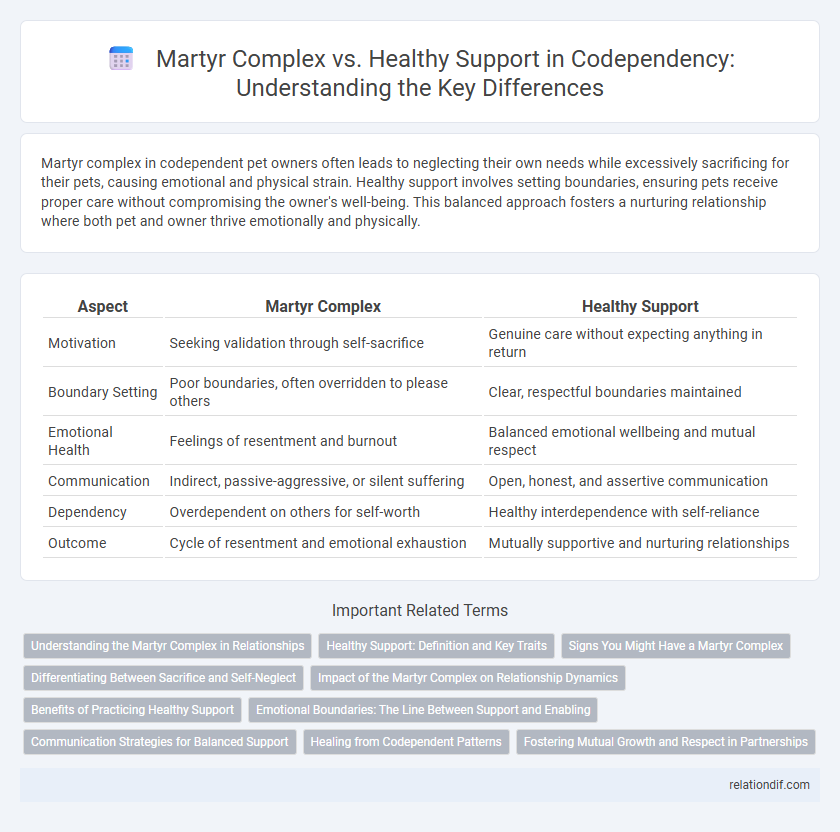Martyr complex in codependent pet owners often leads to neglecting their own needs while excessively sacrificing for their pets, causing emotional and physical strain. Healthy support involves setting boundaries, ensuring pets receive proper care without compromising the owner's well-being. This balanced approach fosters a nurturing relationship where both pet and owner thrive emotionally and physically.
Table of Comparison
| Aspect | Martyr Complex | Healthy Support |
|---|---|---|
| Motivation | Seeking validation through self-sacrifice | Genuine care without expecting anything in return |
| Boundary Setting | Poor boundaries, often overridden to please others | Clear, respectful boundaries maintained |
| Emotional Health | Feelings of resentment and burnout | Balanced emotional wellbeing and mutual respect |
| Communication | Indirect, passive-aggressive, or silent suffering | Open, honest, and assertive communication |
| Dependency | Overdependent on others for self-worth | Healthy interdependence with self-reliance |
| Outcome | Cycle of resentment and emotional exhaustion | Mutually supportive and nurturing relationships |
Understanding the Martyr Complex in Relationships
The martyr complex in relationships manifests as a pattern where individuals excessively sacrifice their own needs to gain approval or avoid conflict, often leading to emotional exhaustion and resentment. Recognizing this behavior involves identifying one-sided support where boundaries are blurred and self-care is neglected in favor of pleasing others. Healthy support contrasts by maintaining mutual respect, balanced give-and-take, and clear boundaries, fostering emotional well-being for both partners.
Healthy Support: Definition and Key Traits
Healthy support involves providing genuine care and assistance while maintaining personal boundaries and promoting mutual respect. Key traits include empathetic listening, reliable encouragement, and fostering independence without enabling dependency. This balanced dynamic strengthens relationships by empowering both individuals to grow emotionally and maintain self-sufficiency.
Signs You Might Have a Martyr Complex
Persistent feelings of exhaustion and resentment despite constant caregiving may indicate a martyr complex rather than healthy support. Signs include neglecting personal needs to an unhealthy degree, seeking validation through sacrifice, and an inability to set boundaries. Recognizing these patterns helps differentiate codependent martyr behaviors from genuine, balanced support.
Differentiating Between Sacrifice and Self-Neglect
Martyr Complex involves excessive self-sacrifice that leads to self-neglect, where personal needs and boundaries are consistently ignored in favor of others. Healthy support balances empathy with self-care, allowing individuals to help without compromising their well-being or identity. Differentiating these patterns requires recognizing when sacrifice serves mutual growth versus when it fosters dependency and emotional exhaustion.
Impact of the Martyr Complex on Relationship Dynamics
The martyr complex often disrupts relationship dynamics by fostering resentment and imbalance, as one partner consistently sacrifices their needs while expecting acknowledgment or control. This behavior undermines mutual respect and open communication, leading to emotional exhaustion and stunted personal growth for both individuals. In contrast, healthy support encourages reciprocity and boundaries, promoting trust and collaboration that strengthen relational bonds.
Benefits of Practicing Healthy Support
Practicing healthy support fosters mutual respect and emotional growth, contrasting with the self-sacrificing nature of martyr complex that often leads to resentment and burnout. It encourages clear boundaries, enhancing personal well-being and strengthening relationships through balanced giving and receiving. This approach promotes resilience and authentic connection, essential for sustained mental health and interpersonal harmony.
Emotional Boundaries: The Line Between Support and Enabling
Martyr Complex manifests through chronic self-sacrifice that blurs emotional boundaries, often leading to enabling rather than genuine support. Healthy support respects personal limits, fostering autonomy while providing empathy without losing self-identity. Establishing clear emotional boundaries prevents enmeshment and promotes balanced, sustainable relationships.
Communication Strategies for Balanced Support
Effective communication strategies in distinguishing martyr complex from healthy support involve setting clear boundaries and expressing needs without self-sacrifice. Active listening and assertive dialogue promote mutual respect and prevent resentment often seen in codependent relationships. Prioritizing transparent, balanced exchanges fosters emotional autonomy while maintaining genuine care and encouragement.
Healing from Codependent Patterns
Healing from codependent patterns requires distinguishing between a martyr complex, characterized by self-sacrifice and resentment, and healthy support, which involves balanced empathy and boundary-setting. Effective recovery focuses on developing self-awareness, reinforcing personal boundaries, and fostering mutual respect in relationships. Therapeutic interventions and support groups can facilitate this transformation by promoting emotional autonomy and reducing dependency-driven behaviors.
Fostering Mutual Growth and Respect in Partnerships
Martyr Complex in codependency often involves one partner sacrificing their needs excessively, leading to imbalance and resentment rather than genuine support. Healthy support fosters mutual growth and respect by encouraging open communication, setting boundaries, and valuing each individual's well-being within the partnership. Prioritizing reciprocal care transforms relationships into collaborative environments where both partners thrive emotionally and personally.
Martyr Complex vs Healthy Support Infographic

 relationdif.com
relationdif.com